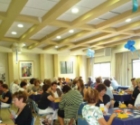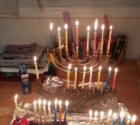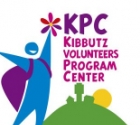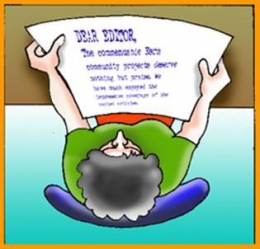
Jack Rabinowitz retiring after 11 years organizing midweek walks
It is nearly 10 years since I first joined ESRA on one of their midweek walks. It was Wadi Chaverim followed by Ein Avdat, and I knew that I had found what I wanted - walks of 6-16 kilometers, depending on the terrain. It meant getting up really early in the morning to do my morning chores before either getting on a train to Beit Yehoshua or a bus to the Jerusalem area to join the group.
Jack was the centerpiece of our walks, never getting excited and always finding a solution to the problem of getting the maximum number of walkers to make it financially viable. Even when we were short of people we never had a cancelled walk. And if it rained - well, bring your “wellies”, as who cares about a bit of rain?
This letter is a way to say to Jack: "Thank you, you have been marvelous and we hope you continue walking with us for many years."
When I say we, I mean all the people who have been walking, walk after walk, just for the fun of the outdoors and seeing new areas from the north of Israel and down to the south.
Henry Gild
Moshav Orot
Volunteer Tutoring in Bat Yam
Olive Simon has been volunteering with the 'English for Schools' program in Tel Aviv for several years. She recently started volunteering at Tichon Hadash in Bat Yam, where her daughter is the school principal. Olive decided to involve ESRA in this effort. Here is her email on the subject.
“……. I wanted to give a hand in my daughter's school with the backing of ESRA.
I might have just used the degree of ESRA skill from past years and knuckled down to help in the school, but that would have isolated me and obviated a greater benefit that I trust will eventually ensue both for the schoolchildren and for future Bat Yam ESRA volunteers who will know the joy of communicating with these great kids.
By bringing ESRA into the picture there is the promise of growth and the possibility of development. Through ESRA, the school has already gained the benefit of Susan O'Neil's help. With the help of ESRA people, Susan's desire to establish an ESRA group in Bat Yam might move from dream to reality with benefits for English speaking Bat Yam residents of which they are still, at present, unaware.
I feel as though I'm watching the beginning of something important.”
Olive Simon, Tel Aviv
Would you too like to be a volunteer tutor – call Gill Teicher, Coordinator ESRA English for Schools, 03 602 1008, 054 299 9955.
Secular side of Chanukah
In reply to the article “Chanukah 5772 - The True Miracle of Chanukah” by Rabbi Frimer (ESRA MAGAZINE # 162), I would suggest that one should look not only at the religious aspect of Chanukah, but also the secular side. The political situation at the time of the Maccabean Revolt from 168-164 BCE and the period leading up to the revolt and its aftermath are not the subject of this letter.
There are four sources which relate to Chanukah. The first is 1 Maccabees, written approximately 50 years after the event in Jerusalem. In chapter 4, it states that Judas Maccabeus, after defeating the Antiochian army led by Lysias, entered Jerusalem. There he found the Temple desecrated and detailed blameless priests to clean and sanctify the sanctuary. He also declared that a feast of thanksgiving was to last for eight days every year, starting on the 25th day of Kislev. There is no mention of a vial of oil found to light the sanctuary.
The second source is 2 Maccabees written in Greek c 124 BCE, probably in Alexandria, and is a shortened version of 1 Maccabees. In chapter 10 there is a précised account of Judas Maccabeus entering Jerusalem and cleansing the Temple. There is no mention of a vial of oil.
The third source is Josephus. In his book Jewish Antiquities xii, 316-326, he describes the events of Judas Maccabeus entering Jerusalem, cleansing the Temple and celebrating Chanukah. Again there is no mention of a vial of oil found and lasting for eight days. Josephus wrote Jewish Antiquities some 250 years after the events and probably had a copy of 1 Maccabees in his possession.
The fourth source is the Babylonian Talmud, compiled between the 3rd and 5th centuries. In Book 1, Tract Sabbath, chapter 2, we find the following passage:
“What is Chanukah? The rabbis taught: "On the twenty-fifth day of Kislev Chanukah commences and lasts eight days, on which lamenting (in commemoration of the dead) and fasting are prohibited. When the Hellenists entered the sanctuary, they defiled all the oil that was found there. When the government of the House of Asmoneans prevailed and conquered them, oil was sought to feed the holy lamp in the sanctuary and only one vial was found with the seal of the high priest intact. The vial contained sufficient oil for one day only, but a miracle occurred, and it fed the holy lamp eight days in succession. These eight days were the following year established as days of good cheer, on which psalms of praise and acknowledgment (of God's wonders) were to be recited.”
The rabbinical sources do not associate the Maccabean revolt, or Chanukah which commemorates it, with resistance to Hellenism. This is the first time that a vial of oil was found and lasted eight days. I do not dispute Rabbi Frimers’ article, but wanted to show the secular side of Chanukah.
Robin Froumin, M.A.
Hadera
Where are ALL the English Speakers in Haifa, the Krayot, Yokneam, Kiryat Tivon, Ramat Yishai and Migdal HaEmek?
When I first came up with the idea to start a new branch of ESRA in the Haifa,the Krayot and surrounding areas, I received so many phone calls and emails from people telling me how happy they were to have an ESRA branch in this area and how long they have been waiting for this.
Now that there is a branch of ESRA here, I am surprised that there is not more enthusiasm in the English speaking community, from volunteers and from people looking for a social life among other English speakers.
Ihave been in this country since 1974. Although I am here in Israel many more years than I ever lived in the USA, I still have the need to be with other English speaking people. It is most important for me never to forget my English and my way of life back where I grew up. This is basically why I joined ESRA in the first place. I have met so many new and interesting people in ESRA and I have gotten involved in things that I never thought I would be able to do.
I remember how it was for me when I first came to Israel. Not knowing anyone and not being able to speak Hebrew, I felt very lonely. It took a very long time for me to get used to the Israeli way of life. Even today, after 37 years of living here, there are still lots of things that I cannot accept here [mostly the chutzpa], but somehow I do manage to fit into the Israeli lifestyle. As long as I never forget “right from wrong” and how not to lose my temper over every little thing that doesn’t go my way, then I am okay, no matter how difficult it may be.
Having other English speaking people to talk to and to help me and allow me to help them, makes all the difference in the world. Not having much family here, I have come to build my own family through close friends. Helping out other Anglos by hosting them in my home, or advising them where there is a good place to shop or live or which school is good for their children, is so important to them and it gives me a really good feeling knowing that I am helping people who need and appreciate my help.
Meeting and getting involved with newcomers to Israel is something that I really enjoy doing. A person can never have too many friends. This is what ESRA has done for me. And my way of thanking ESRA is by getting involved and doing as much as I possibly can.
I think it is so important for people to know that they can depend on others for help whenever it is needed. As Chairman of the Lev Hamifratz branch, I personally invite each and every Anglo in Haifa, the Krayot and surrounding areas to join our branch either as a volunteer or just for social purposes. Whatever your reasons are, just know that you can always feel free to contact me at any time for any reason. I am always looking to make new friends and to help people with whatever I can. Come and join my family and allow me [us] to help you feel more comfortable living here.
The Lev Hamifratz branch now has a game night going on in my home every Wednesday night. We play Canasta. Anyone wanting to join us is more than welcome. Just call me to get instructions how to get to my house. If you do not know how or do not want to play Canasta, then other games can be played as well, if there are enough people to play them. Come one, come all!
Marsha Ohayon
Chairman ESRA Lev Hamifratz
Mobile: 050 228 0755
THANK YOU YONA APARTMENTS IN NETANYA
Yona Apartments kindly allow us to use their garden room for packing and picking up the copies of ESRA MAGAZINE. Recently they had a small electrical fire in their lobby which resulted in their having to use “our” room as their lobby/office.
Now all is well and they have a wonderful bright new lobby, and we have our room back.
However, the period during which we did not have the use of the room made us realize how much we appreciate their help. Even when we were not able to use the room for packing, they allowed us to use the Yona Apartments building for picking up the magazines.
A beautiful plant from ESRA now graces the new lobby as a small token of appreciation from us and to say “thank you” to Mrs. Tempelhof, Edith and the rest of the people at the Yona for their continued help and support of ESRA.
So on behalf of the more than 50 packers, distributors, phoners and substitutes in Netanya – Thank you Yona!
Sheila Keshev
Coordinator of ESRA MAGAZINE distribution in Netanya
Volunteers helping students with English
I want to thank ESRA for giving me the opportunity to participate in the English for Schools project, whereby volunteers help students with English.
Like most volunteers, I did not know what to expect when I started, but it has proved to be a great experience. You learn another side of Israeli life which is not published or broadcast but that gives you a tremendous feeling of pride in young Israelis.
After being in contact with them you cannot but be optimistic for the future.
I would really recommend anyone who has the chance to give this program a tryout. If the students get as much benefit as the volunteers, it will have helped them.
Stanley Cannings
Kibbutz Kfar Hamaccabi
Worth viewing ESRAvision
What a wonderful program - ESRAvision's January 2012 magazine. There is an exciting variety of topics, ranging from Raanana's Wine Festival and the chic sushi restaurants in Tel Aviv to the small Jewish village in Uganda, hats for soldiers, and SOS for homeless pets. These stories are interesting and are filmed, edited and presented in a most professional way. The members of ESRAvision deserve 'kudos' for their dedication, hard work and talent.
Debby Lieberman
Herzliya
Editor’s Note: You can view ESRAvision’s January program on YouTube http://www.youtube.com/watch?v=iIPNvAPa9vE&feature=youtu.be
Exhibition to be mounted about The Jews of District Six
The Isaac and Jessie Kaplan Center for Jewish Studies and Research at the University of Cape Town is mounting an exhibition about “The Jews of District Six” towards the end of 2012.
While District Six has become an international symbol for the inhumanity of the apartheid regime, few remember that in the first two decades of the twentieth century, District Six became home to thousands of Jews fleeing persecution in Eastern Europe. These immigrants settled in what was then the most integrated and cosmopolitan area of South Africa; and although most Jewish families had moved out of the area by the 1930s, many of their businesses remained until District Six was finally razed to the ground.
This is the first time the public will have the opportunity to experience this important aspect of Cape Town’s history, and we are appealing for personal memorabilia covering the period from 1890 to 1940 that could help enrich the exhibition. Photographs of people and places, as well as any documents covering that period would be greatly appreciated.
If you are able to help, or can supply us with contact details of people we should approach, please email Janine.blumberg@uct.ac.za: Phone: 27 21 650 3062; Fax 27 21 6505151
Prof. Milton Shain, Director
Isaac and Jessie Kaplan Center for Jewish Studies & Research, UCT
Ingrid
I would like to wish Ingrid Gvili all the best. From the day she arrived at ESRA, I have enjoyed her smile and her Sabra directness (dugriut) although she is not a Sabra.
Personally, since moving away from the center of ESRA activities, Ingrid has been a great help whenever I have had a problem.
Adele Rubin, Sderot
 ESRA College Netanya is reborn
ESRA College Netanya is reborn ESRA HERZLIYA ACTIVITIES
ESRA HERZLIYA ACTIVITIES Chanukah Celebration at ESRA Rishon LeZion
Chanukah Celebration at ESRA Rishon LeZion -1536952992.jpg) Happy times of Shirley at Jockey Club
Happy times of Shirley at Jockey Club-1452334275.jpg) We've got Mail
We've got Mail Connecting with your Kibbutz volunteer friends
Connecting with your Kibbutz volunteer friends Reader
Reader